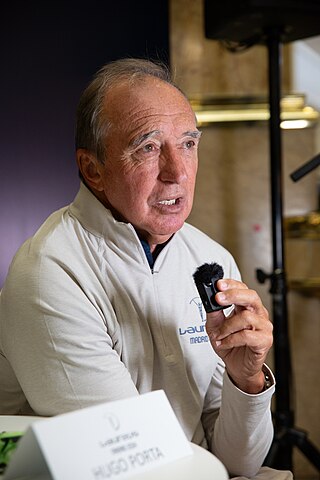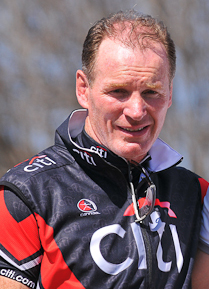
The Australia men's national rugby union team, nicknamed the Wallabies, is the representative men's national team in the sport of rugby union for the nation of Australia. The team first played at Sydney in 1899, winning their first test match against the touring British Isles team.

Hugo Porta is an Argentine retired rugby union player. Considered one of the best fly-halves the sport has seen, he is an inductee of both the International Rugby Hall of Fame and IRB Hall of Fame. During the 1970s and 1980s, he played 58 times for Argentina, captaining them on 34 occasions, including leading them during the first World Cup in 1987.

David Ian Campese, AM, also known as Campo, is a former Australian rugby union player (1982–1996), who was capped by the Wallabies 101 times, and played 85 Tests at wing and 16 at fullback.
Mark Gordon Ella, AM is an indigenous Australian former rugby union footballer. Ella played at flyhalf/five-eighth and was capped by the Wallabies 25 times, captaining Australia on 10 occasions.

Simon Paul Poidevin is a former Australian rugby union player who played as a flanker. Poidevin made his Test debut for Australia against Fiji during the 1980 tour of Fiji. He was a member of the Wallabies side that defeated New Zealand 2–1 in the 1980 Bledisloe Cup series. He toured with the Eighth Wallabies for the 1984 Australia rugby union tour of Britain and Ireland that won rugby union's "grand slam", the first Australian side to defeat all four home nations, England, Ireland, Wales and Scotland, on a tour. He debuted as captain of the Wallabies in a two-Test series against Argentina in 1986, substituting for the absent Andrew Slack. He was a member of the Wallabies on the 1986 Australia rugby union tour of New Zealand that beat the All Blacks, one of six international teams and second Australian team to win a Test series in New Zealand. During the 1987 Rugby World Cup, he overtook Peter Johnson as Australia's most capped Test player against Japan, captaining the Wallabies for the third time in his 43rd cap. He captained the Wallabies on a fourth and final occasion on the 1987 Australia rugby union tour of Argentina before injury ended his tour prematurely. In 1988, he briefly retired from international rugby, reversing his decision 42 days later ahead of the 1988 Bledisloe Cup series. Following this series, Poidevin returned to the Australian side for the single 1989 Bledisloe Cup Test. He returned full-time to the Australian national squad for the 1991 season. Poidevin was a member of the Wallabies that won the 1991 Rugby World Cup, after which he retired from international rugby union.
Nicholas Campbell Farr-Jones AM is a former Australian rugby union footballer. His position was scrum-half. Farr-Jones debuted for the Australia national rugby union team during the 1984 Australia rugby union tour of Britain and Ireland, during which the Australia won the grand slam of rugby union when they defeated all four Home Nations. He was voted "Player of the Series" for the 1986 Australia rugby union tour of New Zealand, during which Australia became the sixth team in history to win a rugby Test series in New Zealand. He was appointed captain of the Wallabies prior to the commencement of their 1988 international season. He is probably best remembered for captaining Australia to their the 1991 Rugby World Cup. Farr-Jones retired as captain of Australia after a victory against South Africa in 1992 and temporarily ceased playing international rugby. He came out of retirement in 1993 for the single Bledisloe Cup Test and a three-Test home series against South Africa, following which he retired from international rugby. He now works at Taurus Funds Management, appears as a TV rugby commentator on UK Sky Sports and is the chairman of the New South Wales Rugby Union.
Kenneth William Catchpole was an Australian rugby union footballer. A state and national representative half-back, he played twenty-seven matches for Australia, thirteen as captain. Catchpole rose through the ranks at the Randwick club as a young man, before making his debut for New South Wales at only 19 years of age, then captaining Australia at age 21. He is considered one of Australia's greatest rugby scrumhalves.
Andrew Gerard Slack is an Australian former state and national representative rugby union player who captained the Wallabies in 19 Test matches in between 1984 and 1987. His 133 appearances for Queensland between 1975 and 1987 stood as the state record until bettered by Mark Connors in 2006.
The 1984 Australia rugby union tour of Britain and Ireland was a series of eighteen matches played by the Australia national rugby union team in Britain and Ireland between 17 October and 15 December 1984. The Australian team won thirteen matches, drew one and lost four but notably won all four of their international matches.
Colin "Col" Windon, was a rugby union player and soldier who captained Australia – the Wallabies – in two Test matches in 1951. By age 18 Windon was playing at flanker for his club Randwick in Sydney's Shute Shield. After serving with the Second Australian Imperial Force in the Pacific Theatre during the Second World War, Windon resumed his rugby career in 1946. He was first selected for Australia for their tour of New Zealand that year. Despite the Wallabies losing both their Tests on tour, Windon impressed with his play.
Steve Williams is an Australian former state and national representative rugby union player who captained the Wallabies in five Test matches in 1985.
The 1981–82 Australia rugby union tour of Britain and Ireland was a series of matches played by the Australia national rugby union team. The touring team played twenty-three matches between October 1981 and January 1982, winning sixteen games, drawing one and losing six. The scheduled final game, against the Barbarians, was cancelled due to heavy snow.
The 1975–76 Australia rugby union tour of Britain and Ireland was a series of matches played by the Australia national rugby union team. The team was referred to as the "Sixth Wallabies", although they were actually only the fifth Australian touring team to undertake a full tour of Britain & Ireland; the "Second Wallabies" of 1939–40 had to return home without playing a game when the World War II broke out.
The 1984 New Zealand rugby union tour of Australia was a series of fourteen rugby union matches played by the New Zealand national rugby union team in Australia in July and August 1984. The All Blacks won thirteen games and lost only the first of the three international matches against the Australia national rugby union team. It was the 25th tour of Australia by a New Zealand team.
The 1933 Australia rugby union tour of South Africa and Rhodesia was a series of 23 rugby union matches played by the Australia national team in 1933.
The 1980 Australia rugby union tour of Fiji was a series of 3 matches played in May 1980 by Australia in Fiji.
The 1986 Australia rugby union tour of New Zealand was a series of matches played by Australia national rugby union team in New Zealand between July and September 1986. Australia won the series against New Zealand with two victories in three matches.
The 1990 Australia rugby union tour of New Zealand was a series of matches played by the Australia national rugby union team in New Zealand between July and August 1990.
The 1984 Australia rugby union tour of Fiji was a series of 3 matches played in May 1984 by Australia in Fiji.



